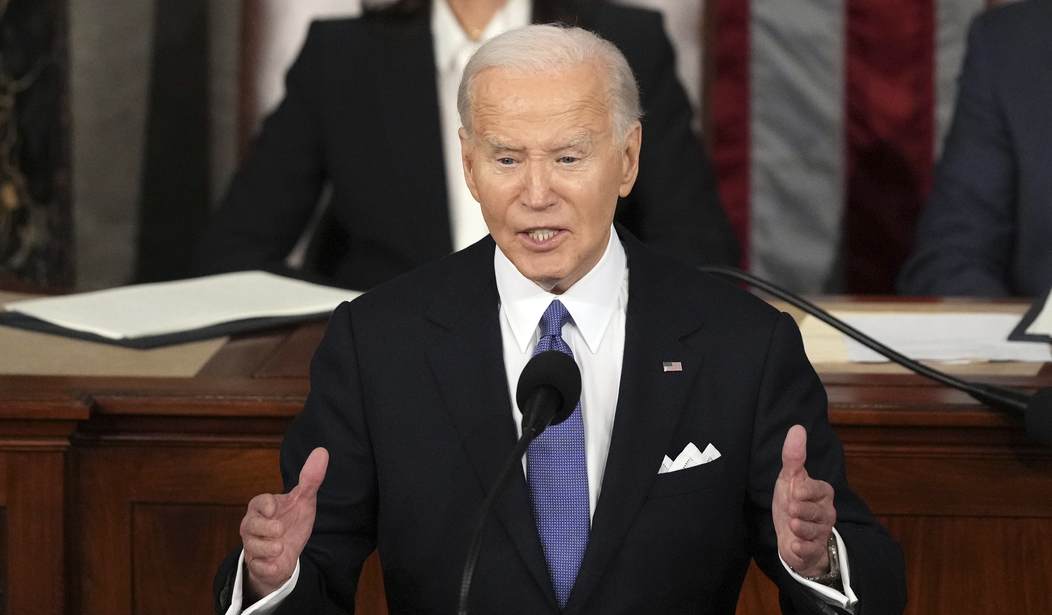President Joe Biden -- in his State of the Union address -- once again tried to present himself as a "fiscally responsible" president.
"And, by the way, the first couple of years, we cut the deficit," he said, according to the White House transcript of his speech.
"I've been delivering real results in fiscally responsible ways," he said. "We've already cut the federal deficit -- we've already cut the federal deficit by over $1 trillion."
"It's my goal," said Biden, "to cut the federal deficit another $3 trillion by making big corporations and the very wealthy finally beginning to pay their fair share."
Biden made similar claims in the fiscal 2025 budget proposal the White House published this week.
"So far, we have already cut the deficit by $1 trillion since I took office, one of the biggest reductions in history, and I have signed legislation to cut it by $1 trillion more," he said in his statement to Congress at the beginning of the proposal. "My Budget would reduce it by another $3 trillion over the next 10 years as well, while continuing to pay for our investments in America."
As this column has noted before, Biden also made such claims in his fiscal 2023 budget proposal, which was released in March 2022.
"Critically, my Budget would also keep our Nation on a sound fiscal course," Biden said in that proposal.
"The deficit is on track to drop by more than $1 trillion this year, the largest-ever one-year decline," that March 2022 proposal said.
"The Budget's investments are more than paid for through additional tax reforms that ensure corporations and the wealthiest Americas pay their fair share, allowing us to cut costs for American families, strengthen our economy, and cut deficits and debt by more than $1 trillion over the coming decade," Biden said.
Recommended
Yet the historical budget numbers published by Biden's own White House and the future numbers estimated in his new budget proposal do not tell a story of fiscal discipline and responsibility.
In President Donald Trump's first three years in office, the federal deficit never topped a trillion dollars. In fiscal 2017, which started on Oct. 1, 2016 (more than three months before Trump's inauguration), the deficit was $665.45 billion, according to the numbers published by the White House Office of Management and Budget.
In fiscal 2018, Trump's first full fiscal year as president, the deficit was $779.074 billion. In fiscal 2019, it was $983.588 billion.
Then, the COVID-19 pandemic hit.
In March and April of 2020, Congress passed four COVID-19 relief bills. Trump signed each of them. According to a Congressional Research Service report published in October 2021, these four bills resulted in an additional $1,826,482,000,000 in spending in fiscal 2020.
The deficit in that fiscal year, according to OMB, spiked to approximately $3.132 trillion.
Biden succeeded Trump on Jan. 20, 2021 -- three months and three weeks into fiscal 2021. That fiscal year, the federal deficit was approximately $2.775 trillion.
In fiscal 2022, did the federal deficit drop back down to below a trillion dollars? No. According to the numbers published by Biden's OMB, the deficit was $1,375,920,000,000 that year. In fiscal 2023, it was $1,693,725,000,000.
As this writer has reported for the Daily Caller News Foundation, the budget proposal that Biden published this week estimates that the federal debt subject to the statutory limit would increase by at least $14.8 trillion during Biden's time in office were he to be elected to a second term.
On Jan. 20, 2021, according to the Daily Treasury Statement, the total debt subject to the statutory limit was $27,725,725,000,000. Table S-10 in Biden's new budget proposal estimates that the total debt subject to the statutory limit (which is now suspended until next Jan. 1, 2025) will be approximately $42,537,000,000,000 at the end of fiscal 2028 (which is three months and three weeks before the end of the next presidential term).
That is an increase of $14,811,275,000,000 -- or 53.4%.
The same table in Biden's budget proposal estimates that the annual federal deficit will never drop below $1.5 trillion between now and fiscal 2028. This fiscal year, according to the White House estimates, the deficit will be $1.859 trillion -- or 89% more than the $983.588 billion deficit the federal government ran in fiscal 2019 before the COVID pandemic hit.
Even when adjusted for inflation from September 2019 dollars to February 2024 dollars (using the Bureau of Labor Statistics inflation calculator), the fiscal 2019 deficit equals $1.18879 trillion.
That is less than the $1.37592 trillion deficit that the federal government ran in fiscal 2022, according to OMB, or the $1.69372 trillion deficit it ran in fiscal 2023 -- during the Biden years.
This is what Biden calls "delivering real results in fiscally responsible ways."

























Join the conversation as a VIP Member